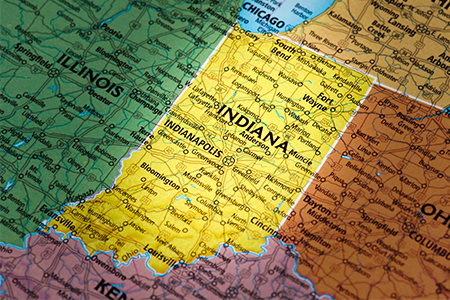You May Also Like
INDIANA CPA EXAM & LICENSE REQUIREMENTS 2024
Though there are many certifications available to accountants, none are able to trump a CPA license from your state.

There are few fields that are as in demand and growing as that of accountancy. Accountants function as business consultants and even work to audit computer systems. They can work anywhere, from law enforcement to non-profit organizations.
Though there are many certifications available to specialize in your accountancy practice, none are able to trump a Certified Public Accountant license from your state. The requirements are quite strict and each state has their own standards for license candidates, but with a little hard work and determination, you could soon put the letters CPA at the end of your name. Keep reading to learn how to become a CPA in Indiana.
Requirements to Practice
Indiana’s requirements may be like many other state requirements, but you’ll still need to meet their standards to make sure that your application will be processed correctly the first time. Indiana also requires experience on top of passing scores on all four parts of the CPA exam. Indiana will provide licenses to those who do not have state residency and even those who are not U.S. Citizens. The state does require a Social Security number, but check with the state licensing board, the Indiana Board of Accountancy, to verify whether or not you can substitute another valid taxpayer identification number if you do not have one.
Education
To be awarded an Indiana CPA license, you will need to have the proper educational background. Indiana requires a minimum of 150 semester hours that have culminated in at least an undergraduate degree. Your college or university must be fully accredited by a regional accreditation agency. Discuss accreditation with your advisor to clarify that your education is putting you on track to becoming a CPA. Indiana has two ways to meet its educational standards for CPAs. The specifics, including coursework are:
Option 1
- 150 semester hours that include a graduate-level degree
- 24 semester hours of undergraduate accounting work OR
- 15 semester hours of graduate-level work in accounting
Coursework must cover the following subjects:
- Financial Accounting
- Auditing
- Taxation
- Managerial Accounting
24 hours of non-accounting, business-related courses at the undergraduate or graduate level that meet these requirements:
- Up to six hours of business and tax law
- Up to six hours studying computer science
Option 2
150 semester hours of undergraduate work that has resulted in a baccalaureate degree from a recognized, accredited institution. Coursework must include 24 semester hours in accounting courses at either the graduate or undergrad level that cover:
- Financial Accounting
- Auditing
- Taxation
- Managerial Accounting
24 hours in non-accounting, business-related coursework that includes:
- No more than six hours studying business and taxation law
- No more than six hours studying computer science
Once you have completed this rigorous course of study with the guidance of a helpful advisor, you will need to send your transcripts to CPA Examination Services at the National Association of State Boards of Accountancy (NASBA).
If you have completed your education outside of the United States, your work must be evaluated and qualified for submission by one of the following agencies:
- NASBA International Evaluation Services
- Educational Credential Evaluators, Inc.
- Foreign Academic Credentials Service, Inc.
- Josef Silny & Associates, Inc., International Education Consultants
Note that you must have original transcripts sent for your evaluation, and you must have a transcript sent from every institution you attended, regardless of how your credits transferred. To make the process easier, have your sealed documents sent directly to NASBA.
Upon completion of the educational portion of the process, you will qualify to sit for the uniform CPA examination. This is a 4-part test devised by the American Institute of Certified Public Accountants (AICPA.) The test is continually updated by working CPAs who propose new test items that they feel are relevant and timely for applicants. The test is not easy and many need to retake part or all of it. The four parts of the test are:
- Financial Accounting and Reporting (FAR)–Covers financial reporting frameworks from several industry experts. Candidates are asked to compare statements that reflect different reporting standards.
- Auditing and Attestation (AUD)–This is a test of your knowledge of the International Standards of Auditing as well as U.S. standards.
- Regulation (REG)–Your professional and legal responsibilities as a practicing CPA are covered in this test.
- Business Environment and Concepts (BEC)–This portion covers general business concepts and international business. Written communication skills are vital to complete much of the test.
You may take each part individually and over a period of time, or take each in rapid succession. Once you have scheduled a test however, you must sit for that part within six months of scheduling. If you miss the six month window, you will need to reapply to AICPA.
Since Indiana has no ethics exam requirement, the final portion of the road to licensure is your work experience. You will need to work for two years to achieve your initial license, but four years to receive a reciprocal permit. You will not need to work directly under a CPA, but you will need to have your experience verified by a licensed CPA.
Indiana has great opportunities for new CPAs. Most CPAs work in banking, utilities, government and manufacturing facilities. To get started on your path to licensure, visit the state board’s website: Indiana Board of Accountancy.